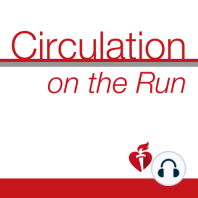25 min listen
Circulation January 18, 2022 Issue
ratings:
Length:
20 minutes
Released:
Jan 18, 2022
Format:
Podcast episode
Description
Please join author Mohamed Abdel-Wahab and Associate Editor Stefan James as they discuss the article "Comparison of a Pure Plug-Based Versus a Primary Suture-Based Vascular Closure Device Strategy for Transfemoral Transcatheter Aortic Valve Replacement: The CHOICE-CLOSURE Randomized Clinical Trial." Dr. Carolyn Lam: Welcome to Circulation on the Run. Your weekly podcast summary and backstage pass to the Journal and its editors. We're your co-hosts. I'm Dr. Carolyn Lam, associate editor from the National Heart Center and Duke National University of Singapore. Dr. Greg Hundley: And I'm Dr. Greg Hundley, associate editor, director of the Pauley Heart Center at VCU Health in Richmond, Virginia. Well, Carolyn, this week's feature, a very interesting topic, looking at closure devices at the sites of access for patients that are undergoing TAVR procedures. But before we get to that, how about if we grab a cup of coffee and start with some of the other articles in the issue. Would you like to go first? Dr. Carolyn Lam: I would love to and I would like to describe not just one, but two articles from recent SGLT2 inhibitor trials. So, the first paper is an analysis of the DAPA-HF trial. Now we know that circulating high sensitivity, cardiac troponin T predominantly reflects myocardial injury. And higher levels are associated with a higher risk of worsening heart failure and death in patients with heart failure with reduced ejection fraction or HFrEF. But what about the prognostic significance of changes in high sensitivity troponin T over time and the effects of Dapagliflozin and on clinical outcomes in relation to baseline levels, as well as the effect of dapagliflozin on the high sensitivity troponin T levels? Well, this is what this study answers. It's a biomarker substudy of the DAPA-HF trial from Dr. Berg of the TIMI study group at Brigham women's hospital and colleagues. Dr. Greg Hundley: Wow. Carolyn, very interesting. So remind us about the DAPA heart failure trial. What was it about? Dr. Carolyn Lam: Ah, well, DAPA-HF was a randomized double blind placebo control trial of dapagliflozin in patients with symptomatic HFrEF defined by injection fraction 40% or less wherein dapagliflozin significantly reduced the primary endpoint of cardiovascular death or worsening heart failure events. And in today's biomarker substudy increases in high sensitivity, cardiac troponin T over a one year interval of time were highly predictive of subsequent risk of worsening heart failure and cardiovascular death. The effect of dapagliflozin on the primary endpoint was consistent irrespective of baseline troponin T concentration with no evidence of attenuated treatment benefit in those with very high troponin T concentrations. Dr. Greg Hundley: Very interesting Carolyn. Now you've got another study. Is this one on EMPA? Dr. Carolyn Lam: You are right. Thank you. The next paper is and analysis of the Emperor-Preserved trial. As a reminder, Emperor-preserved study the SGLT2 inhibitor empagliflozin in patients with HFpEF this time, which is a left ventricular ejection fraction above 40, and showed a significant reduction in the risk of cardiovascular death or heart failure hospitalization. The current paper evaluated the efficacy of empagliflozin on health related quality of life in patients with HFpEF and whether the clinical benefit observed with empagliflozin varied according to baseline health status. Dr. Greg Hundley: Very nice, super review Carolyn. So what were the results of this study? Dr. Carolyn Lam: In Emperor-Preserved, baseline health status and quality of life did not influence the magnitude of effect of empagliflozin on the risk of cardiovascular death or hospitalization for heart failure. Empagliflozin improved health status and quality of life as assessed by the Kansas city cardiomyopathy questionnaire across all domains and at all measured time points. Thus an effect that appeared early and was sustained for at least one year. Dr. Greg
Released:
Jan 18, 2022
Format:
Podcast episode
Titles in the series (100)
Circulation November 1, 2016 Issue: Dr. Carolyn Lam: Welcome to Circulation On The Run, your weekly podcast summary and backstage pass to the journal and its editors. I'm Dr. Carolyn Lam, Associate Editor from The National Heart Center and Duke National University of Singapore.... by Circulation on the Run
